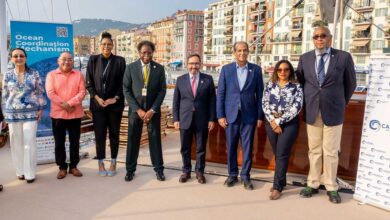(CARICOM Secretariat, Turkeyen, Greater Georgetown, Guyana) The greatest assurance of the survival of small states lies in their diplomacy and their ability to maximise benefits from the existence of international law, Ambassador Lolita Applewhaite, Caribbean Community (CARICOM) Deputy Secretary-General said on Monday, March 2, 2009.
Ambassador Applewhaite was at the time addressing a High-level Regional Consultation on Diplomatic Training, at the Headquarters of the CARICOM Secretariat, Georgetown, Guyana. The Consultation, funded by the Commonwealth Secretariat, is being co-ordinated by the CARICOM Secretariat and brings together senior officials from CARICOM’s Foreign Ministries.
The two-day consultation at the CARICOM Secretariat seeks to identify specific diplomatic capacity-building needs in the Caribbean Community. The need to assist smaller developing states with their diplomatic efforts became a priority when a number of them including Member States of CARICOM, all members of the Commonwealth, requested support from the Commonwealth Secretariat. Small states account for 34 of the Commonwealth’s 53 member countries.
In her remarks, Ambassador Applewhaite said that CARICOM countries, like several small Commonwealth states were confronted with myriad challenges including rising levels of outward migration and poverty, which had stretched the capacities of their diplomatic service. Exacerbating those challenges, she said, was the fact that Small Island Developing States faced other difficulties including, their ineligibility for concessionary financing to support development needs; compliance costs associated with global efforts to combat terrorism; and climate change accompanied with its concomitant challenges of food security, energy security and water security, she said.
Against that backdrop, the Deputy Secretary-General stated that the CARICOM and Commonwealth Secretariats had been encouraged to redouble their efforts to organise diplomatic training at the Regional level. And, in light of the difficulties smaller developing states were experiencing, the need to train and retrain foreign policy experts was “exceptionally urgent,” she said.
Ambassador Applewhaite stated that two Secretariats were also engaged in exploring the “real needs” of the Community’s Foreign Ministries to devise a “sustainable plan of action” to meet the needs of the Region’s Foreign Ministries “swiftly and comprehensively.”
The Deputy Secretary-General added that she anticipated the consultation would “contribute towards the strengthening of the voice of our small states in the global arena.”





